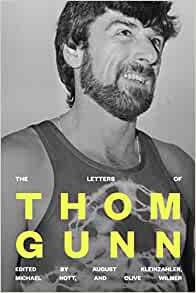 THE LETTERS OF THOM GUNN
THE LETTERS OF THOM GUNN
Edited by Michael Nott, August Kleinzahler, and Clive Wilmer
Farrar, Straus and Giroux
800 pages, $45.
THOM GUNN (1929–2004), though widely recognized as a major British poet of the later 20th century, has often been marginalized by a literary establishment that has never been able to deal fully with his evocative, and explicitly gay, poetry. The publication of Gunn’s letters represents the start of what the poet Andrew McMillan has called “a welcome rebalancing.” As well as providing an intimate portrait of Gunn, the letters also give an insight into the origins of this imbalance. An unmistakable thread running through his letters is the extent to which he was forced to negotiate with a hostile culture as a poet who was a gay man.
Some of the most touching moments are found in Gunn’s love letters to his life partner, Mike Kitay, whom he met at Cambridge in 1952 and followed to the U.S. when he returned home two years later. These letters serve as an important record of how gay men constructed relationships in the pre-Stonewall era: “I love you wholly, so much with all of myself, that I don’t know what to do or say when there are other people by.” Yet between these tender moments are glimpses of the difficulties they both faced. In an early letter to his mentor Yvor Winters, Gunn is forced to invent an imaginary fiancée, as Winters “would have been appalled at the idea I was queer.” More worryingly, in 1956, when Mike was completing two years of compulsory service in the Air Force, Gunn writes in a panic to a friend: “Mike is being ‘investigated’ for homosexuality.” He recounts how they were outed by another man who had “seen us in some queer bars around here,” and how their apartment had been searched by the military police. Mike was threatened with a court-martial, and in the letter Gunn asks—in near desperation—that a female friend from Cambridge pretend to have been Mike’s girlfriend in order to throw off the investigation.
The letters reveal how Gunn’s development as a poet was shaped by his need to censor himself.
Felix Hawlin is a doctoral candidate at Durham University with a specialty in Gunn’s poetry.





